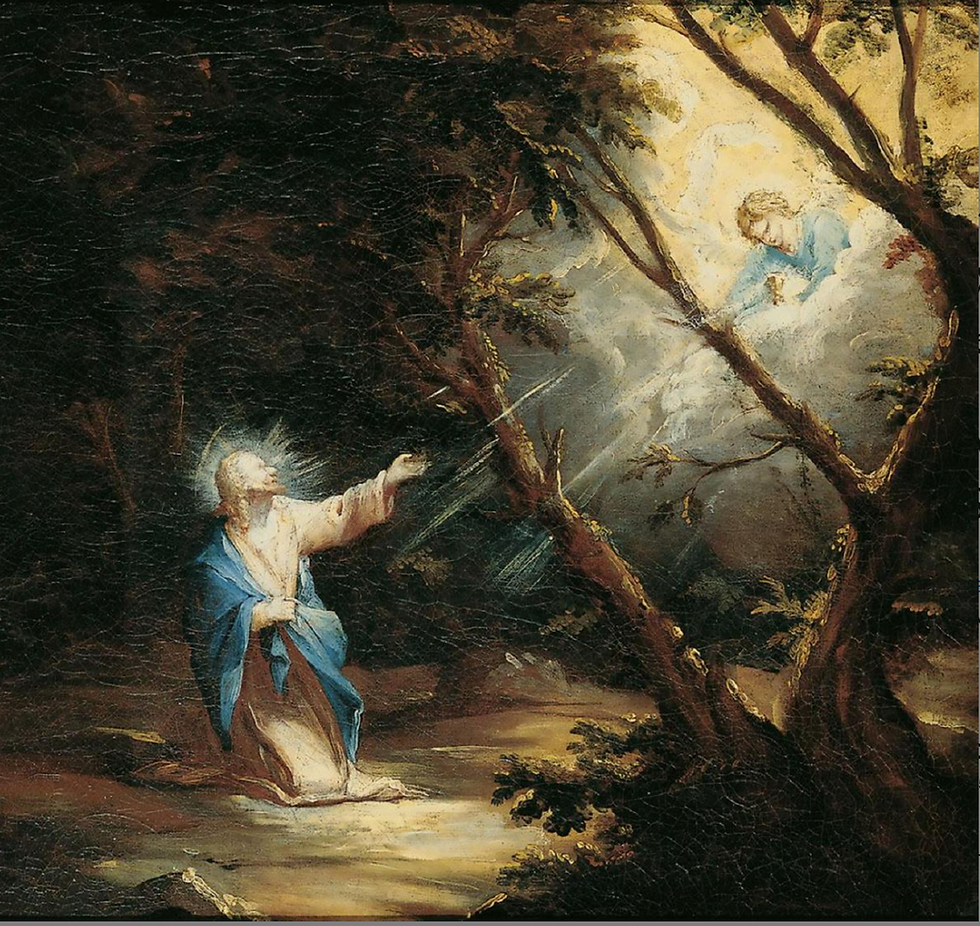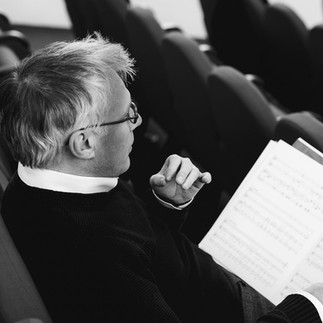Hans Leenders | Three Spiritual Songs from Silesia (2024-2025)
- Eleni Ioannidou
- Jul 28, 2025
- 7 min read
Updated: Jul 30, 2025

Hans Leenders is a Dutch composer, organist, and cantor born in Maastricht in 1965. We owe his acquaintance to a duo that participated in the first edition of the 2022 competition: the Dutch duo of baritone Vincent Kusters and pianist Charlie Bo Meijering. These two artists frequently collaborate with the composer, and so we had the opportunity to hear some of his songs. We were impressed by their beautiful simplicity, respect for the text, and a touch of mystical neo-romanticism. In 2024, we celebrated two anniversaries in the region. 400 years ago (1624), the Christian mystic and philosopher Jakob Böhme died in Görlitz, and in the same year, the important poet and mystic Angelus Silesius (Johannes Scheffler) was born in Wroclaw (Breslau). At the same time, Jewish culture is being particularly promoted in Saxony during these years. In Silesia, the Jews formed a thriving community that also left numerous traces in the arts. Paul Mühsam was a Jewish poet who lived in Görlitz. His poetry is strongly influenced by the spirituality of his religion and mysticism.
These connections, combined with the wish to dedicate the third edition of the competition to spiritual songs, gave us the idea of requesting the composition of three songs dedicated to these thee mystics, each of whom belongs to a different religion: Angelus Silesius (Catholic), Jakob Böhme (Protestant), and Paul Mühsam (Jewish). Together with the composer, we selected three poems and thus the "Three Spiritual Songs from Silesia" were created. It is a joy to present them to young musicians from all over the world in the third edition of the competition. We hope that some of them will perform some of them, or all, here in Silesia, namely in Görlitz and Jauer, in May/June 2026.
The "Three Spiritual Songs from Silesia" are the musical settings of the poems "Fulfillment" (Paul Mühsam), "Prayer" (Jakob Böhme), and "Easter Jubilation" (Angelus Silesius).
Musicians can order the sheet music as a PDF directly from Ascolta Music Publishing (email: info@ascolta.nl).
Hans Leenders is the official composer of the City of Maastricht for 2025 and 2026. We congratulate the composer on this honor and sincerely thank him for his contribution to making an important part of Silesian culture internationally known: Silesian mysticism.
About the three poets
The shoemaker Jakob Böhme was born in 1575 (his 450th birthday this year) in Alt-Seidenberg near Görlitz and received no special education. However, at around the age of 37, he had a mystical experience that prompted him to write philosophical works on Christian mysticism. His most important work, "Aurora oder die Morgenröthe," was written in Görlitz around 1612. Numerous other works followed with titles such as "Der Weg zu Christo," "Mysterium Magnum," and "De incarnatione verbi." Banned as heretic by the Protestant Church, various noblemen disseminated his writings, particularly in the Netherlands, where greater freedom of thought prevailed. In 1682, his complete works were published in Amsterdam with the influence of the diplomat and mayor of Amsterdam, Coonread van Reuningen. Jakob Böhme died young in Görlitz in 1624. His grave in St. Nicholas Cemetery attracts hundreds of tourists and lovers of his philosophy from all over the world. He is considered the first German philosopher. His writings had a profound influence on several subsequent thinkers, including Novalis, Adam Mickiewicz, and Goethe. His mysticism surrounding Jesus and his theories on overcoming evil in the world were particularly important inspirations for the Romantics.
One month after Jakob Böhme's death in November 1624, another Christian mystic, Johannes Scheffler, known as Angelus Silesius, was born in nearby Breslau. Breslau was the capital of Silesia, which was then under Habsburg rule (Austria). The Thirty Years' War, the fighting between Catholics and Protestants, was particularly brutal in this region. Johannes Scheffler was born in a Lutheran family in December 1624 to Stanislaus Scheffler, a Polish nobleman, and Maria Hennemann. His parents sent their child to the famous Elisabethgymnasium in Breslau, where he was exposed to the poems of Martin Opitz, one of the first German poets, who was also a Silesian, and began writing poetry. When Scheffler was sent to study medicine in Strasbourg and Leiden, he encountered the writings of Jakob Böhme in the Netherlands, who greatly inspired him. He continued his studies in Padua and became a physician and philosopher. He returned to Silesia and worked as a doctor. He began to have mystical visions and wrote mystical poems, which earned him great enmity in Lutheran circles (like before him, Jakob Böhme). He then converted to Catholicism and adopted the name "Angelus Silesius" – the Angel from Silesia. Catholic circles allowed him to publish his poems. This resulted in famous spiritual poems, like the famous today anthologies "Holy Soul-Delight" and "The Cherubinic Wanderer." He later became a Franciscan and dedicated himself to the poor and sick in the Maathiasstift (Order of the Knights Templar with the Red Star, now Ossolineum). He led an ascetic life and died in Breslau in 1677 from the effects of illness. A memorial plaque commemorates him in St. Matthew's Church, where he was baptized and lived and worked as a clergyman. There, in the courtyard of Ossolineum, there is also a sculpture honouring him and a café called "Cherubinowy Wędrowiec." Angelus Silesius's poems have often been set to music, not only in the form of chuch-hymns. Composers such as Robert Kahn, Arnold Mendelssohn, and Willy Burkhardt also set his poems to music.
In 1876, approximately 200 years after the death of Angelus Silesius, Paul Mühsam was born in Brandenburg an der Havel. He was the child of a Jewish family from Silesia: Siegfried Seligmann Mühsam was a pharmacist from Landsberg in Upper Silesia who later moved to Lübeck. Paul Mühsam had an even more famous brother, the anarchist Erich Mühsam, who was deeply committed to pacifism and the labor movement and who was murdered by the Nazi Party in the Oranienburg concentration camp in 1934. Paul Mühsam, on the other hand, led a quieter, middle-class life and—unlike his brother—identified with Judaism. The Mühsam family was a middle-class family of assimilated Jews in Lübeck. Paul chose Görlitz as his adopted home, where he practiced as a lawyer from 1905 onwards. His works (prose and poetry) with titles such as "Conversations with God," "The Brotherhood of All Creatures," "On Happiness Within You," "More Human," and "On Quiet Paths" are permeated with deep mysticism and love for God and humanity. In 1933, Mühsam left Görlitz and went to Palestine, where he wrote his memoirs "I Was a Human Being" and died in Jerusalem on March 11, 1960.
About the composer
Hans Leenders (born 1965) studied organ, composition, and Gregorian chant at the conservatories of Maastricht, Utrecht, and Brussels, among others under Jean Wolfs, Jan Raas, Jean Ferrard, and Jean Boyer. Leenders is cantor and organist of the Basilica of Our Lady in Maastricht (Séverin 1652 and Müseler 1765?), conductor of the Basilica Choir, the Basilica Consort, and titular organist of the Kopermolen in Vaals (Hilgers 1765).
He is professor of organ and choral conducting at the Maastricht Academy of Music, artistic director of the professional chamber choir Studium Chorale and the Schola Maastricht, and conductor of the Maastricht Chamber Choir. Leenders is artistic advisor to the L'Europe & l'Orgue organ festival.
He taught Gregorian chant for many years as part of summer courses at the Folkwang University of the Arts in Essen. He has been a guest conductor with the Radio Choir of Slovenia, the Grosser Omroepkoor, the Cappella Amsterdam, Europa Cantat, and numerous European music academies. Orchestral appearances have included him with the Philharmonie Zuidnederland, the Symfonieorkest Vlaanderen, Concerto d'Amsterdam, Florilegium Musicum, and Ensemble88 (with a focus on contemporary music).
In addition to a long list of religious works, the composer has also set several German poets to music: Hugo von Hoffmannsthal's Ballade des Äußeres Leben (Ballade of External Life) and Drei Deutsche Lieder (Three German Songs) by Friedrich Hölderlin, Christian Morgenstern, and Heinrich Heine.
His style can be classified as a contemporary form of Impressionism and Neo-Romanticism. His compositions have been published by Ascolta, Harmonia, and De Haske.
A new CD entitled "Hans Leenders: A Musical Portrait" was released this year by ALIUD Records.
Hans Leenders has been appointed Composer of the City of Maastricht for two years (2025–2026). Website. Sportify.
The Songs
Erfüllung
Nun schweige still, des Tags geschwätzter Mund,
Daß ihre Wunder mir die Nacht verkünde!
Schon steigen Ahnungen aus Urweltgrund
Und weisen mir den Weg, daß ich mich finde.
Geheimstes trägt die Dämmerung im Schoß,
Vorüber huschen Stimmen und Gestalten,
Der Himmel bindet seine Glocke los,
Das Zeitbefreite weitet seine Falten.
Geflüster schwillt zur Flut und rauscht herauf
Von Seelen, die sich weltdurchwandernd trafen,
Und Träume sprengen herbe Hülle auf
In Keimen, die im Unerlösten schlafen.
Und meine Augen fiebern durch die Nacht,
Von Stern zu Stern heißt mich die Sehnsucht schweifen,
Mein Garten steht in später Sommerpracht,
Und meines Lebens letzte Früchte reifen.
Ich trink' das Wiegenlied der Ewigkeit,
Stürz' in die Stimmen, die mich Bruder riefen;
Nach seiner Mutter, der Unendlichkeit,
Schreit auf mein Herz durch alle Himmelstiefen.
Paul Mühsam (1876-1960). Aus der Sammlung „Seit der Schöpfung wurde gehämmert an deinem Haus“
Gebet
O Gott, du überglänzendes, ewigscheinendes Licht,
du hast der äußern Welt das Licht
von dem Hauch deiner Macht
durch die Strahlen deines Lichtes gegeben,
und herrschest mit Sonne und Monde
in allen deinen Werken in dieser Welt Wesen;
du gebärest alles zeitliche Leben durch diese Lichter.
Alles, was Atem hat, wirket und lebet in diesen Lichtern,
und lobet dich in deiner Kraft;
alle Sterne nehmen Licht und Schein
von deinem ausgegossenen Glanze.
Du zierest die Erde mit schönen Kräutern
und Blumen durch dieses Licht,
und erfreust darinnen alles, was lebet und wächset,
und zeigest uns Menschen darinnen deine Herrlichkeit,
daß wir erkennen deine Kraft, die inwendig verborgen ist,
und daran sehen, wie du dein ewiges Wort und Wirkung
sichtbar gemacht hast;
auf daß wir dadurch sollen betrachten dein inwendiges,
geistliches Reich, da du im Verborgenen wohnest
und alle deine Geschöpfe erfüllest,
und alles in allem selber wirkest und tust.
Jakob Böhme (1575 -1624). Aus „Gebete der Christenheit“ (Walter Nigg, Hamburg 1960)

Osterjubel
Jetzt ist der Himmel aufgetan,
jetzt hat er wahres Licht!
Jetzt schauet Gott uns wieder an
mit gnädigem Gesicht.
Jetzt scheinet die Sonne
der ewigen Wonne!
Jetzt lachen die Felder,
jetzt jauchzen die Wälder,
jetzt ist man voller Fröhlichkeit.
Jetzt ist die Welt voll Herrlichkeit
und voller Ruhm und Preis.
etzt ist die wahre goldne Zeit
wie einst im Paradeis.
Drum lasset uns singen
mit Jauchzen und Klingen,
frohlocken und freuen;
Gott in der Höh sei Lob und Ehr.
Jesus, du Heiland aller Welt,
dir dank ich Tag und Nacht,
dass du dich hast zu uns gesellt
und diesen Jubel bracht.
Du hast uns befreiet,die Erde erneuet,
den Himmel gesenket,
dich selbst uns geschenket,
dir, Jesus, sei Ehre und Preis.
Angelus Silesius (1624-1677)
(Erste Seiten der Lieder)

























Comments